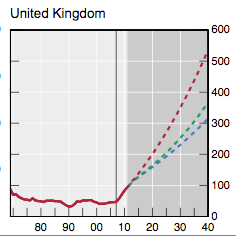
A joke doing the rounds by email at the moment ((And see also this speech by Mark Littlewood at the IEA, which makes good use of another version.)):
While walking down the street one day a Member of Parliament is tragically hit by a truck and dies. His soul arrives in heaven and is met by St Peter at the entrance. ‘Welcome to heaven,’ says St Peter, ‘Before you settle in, it seems there is a problem. We seldom see a high official around these parts, you see, so we’re not sure what to do with you.’ ‘No problem, just let me in,’ says the man. ‘Well, I’d like to, but I have orders from higher up. What we’ll do is have you spend one day in hell and one in heaven. Then you can choose where to spend eternity.’ ‘Really, I’ve made up my mind. I want to be in heaven,’ says the MP. ‘I’m sorry, but we have our rules.’ And with that, St Peter escorts him to the elevator and he goes down, down, down to hell.
The doors open and he finds himself in the middle of a green golf course. In the distance is a clubhouse and standing in front of it are all his friends and other politicians who had worked with him. Everyone is very happy and in evening dress. They run to greet him, shake his hand, and reminisce about the good times they had while getting rich at the expense of the people. They play a friendly game of golf and then dine on lobster, caviar and champagne. Also present is the devil, who really is a very friendly and nice guy who has a good time dancing and telling jokes. They are having such a good time that before he realizes it, it is time to go. Everyone gives him a hearty farewell and waves while the elevator rises…
The elevator goes up, up, up and the door reopens on heaven where St. Peter is waiting for him. ‘Now it’s time to visit heaven.’ So, 24 hours pass with the MP joining a group of contented souls moving from cloud to cloud, playing the harp and singing. They have a good time and, before he realizes it, the 24 hours have gone by and St. Peter returns. ‘Well, then, you’ve spent a day in hell and another in heaven. Now choose your eternity.’ The MP reflects for a minute, then he answers: ‘Well, I would never have said it before, I mean heaven has been delightful, but I think I would be better off in hell.’
So St Peter escorts him to the elevator and he goes down, down, down to hell. Now the doors of the elevator open and he’s in the middle of a barren land covered with waste and garbage. He sees all his friends, dressed in rags, picking up the trash and putting it in black bags as more trash falls from above. The devil comes over to him and puts his arm around his shoulder. ‘I don’t understand,’ stammers the MP. ‘Yesterday I was here and there was a golf course and clubhouse, and we ate lobster and caviar, drank champagne, and danced and had a great time.. Now there’s just a wasteland full of garbage and my friends look miserable. What happened?’
The devil looks at him, smiles and says, ‘Yesterday we were campaigning … Today you voted.

Which is most amusing but it also gives me an excuse to mention public choice theory:
Public choice in economic theory is the use of modern economic tools to study problems that are traditionally in the province of political science. From the perspective of political science, it may be seen as the subset of positive political theory which deals with subjects in which material interests are assumed to predominate.
In particular, it studies the behavior of politicians and government officials as mostly self-interested agents and their interactions in the social system either as such or under alternative constitutional rules. These can be represented a number of ways, including standard constrained utility maximization, game theory, or decision theory. Public choice analysis has roots in positive analysis (“what is”) but is often used for normative purposes (“what ought to be”), to identify a problem or suggest how a system could be improved by changes in constitutional rules.[1]
That is, in a nutshell, for a very long time, that joke has been a reasonable characterisation of politics and the consequence is the catastrophic public debt projection above. The Wikipedia article is somewhat biased against the theory and lacks citations but it is still worth reading.
Now, consider this:
What is that change? Some promise solutions from on high – but real change comes from collective endeavour. So we offer a new approach: a change not just from one set of politicians to another; from one set of policies to another. It is a change from one political philosophy to another. From the idea that the role of the state is to direct society and micro-manage public services, to the idea that the role of the state is to strengthen society and make public services serve the people who use them. in a simple phrase, the change we offer is from big government to big Society.
And this:
The era of big government has run its course.
The former is from the Conservative manifesto and the latter from David Cameron’s Hugo Young lecture on the Big Society. One party is telling people clearly that we need a radical change in the relationship between people and government. It is the Conservative Party.
